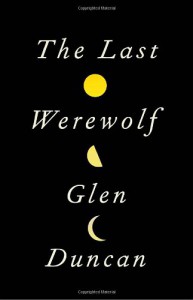Inferno: A Novel (Robert Langdon)
 A prisoner of his formula.
Dan Brown is a prisoner of his formula, finding some odd historical theory and exploding into a novel. Angels & Demons was fun, The Da Vinci Code was inspired, and Inferno is just.....tired. Too much "tour guiding", and forced plot derived from Dante's Inferno.
He should break out of his prison and try something new.
A prisoner of his formula.
Dan Brown is a prisoner of his formula, finding some odd historical theory and exploding into a novel. Angels & Demons was fun, The Da Vinci Code was inspired, and Inferno is just.....tired. Too much "tour guiding", and forced plot derived from Dante's Inferno.
He should break out of his prison and try something new.
Our Game
 Tim is an early middle aged retired spy put out to pasture. The pasture happens to include his girlfriend, the young and very beautiful Emma, and an estate with an improbable English vineyard, and the frequent presence of Larry, the double agent against the Soviets that Tim ran for 20 years. Larry's gone missing, and Emma as well. Has Larry gone to the Soviets one last time? Or are he and Emma lovers, run away? Or both?
But I found Our Game to be different in nature to many Le Carre novels - I found it to be one of his most human and accessible novels, concerned not just with the betrayal of country but the onset of middle age and with it the fears and second-guessing that come with it. And possessed of a surprisingly lyrical tone
"I have invited him here for a clandestine meeting up here on the Mendip Hills, on this moonscape plateau nearer to the sky than to the earth, where the trees throw deadman's shadows on the whited lane and no cars pass."
Our game explores (as Le Carre always does) the geography and emotional landscape of betrayal and the familiarity that sometimes breeds contempt in those we've known for a long time. Our Game also manages to explore infidelity, middle aged self deception and ennui and what we owe our friends, even if they betray us. Recommended.
Tim is an early middle aged retired spy put out to pasture. The pasture happens to include his girlfriend, the young and very beautiful Emma, and an estate with an improbable English vineyard, and the frequent presence of Larry, the double agent against the Soviets that Tim ran for 20 years. Larry's gone missing, and Emma as well. Has Larry gone to the Soviets one last time? Or are he and Emma lovers, run away? Or both?
But I found Our Game to be different in nature to many Le Carre novels - I found it to be one of his most human and accessible novels, concerned not just with the betrayal of country but the onset of middle age and with it the fears and second-guessing that come with it. And possessed of a surprisingly lyrical tone
"I have invited him here for a clandestine meeting up here on the Mendip Hills, on this moonscape plateau nearer to the sky than to the earth, where the trees throw deadman's shadows on the whited lane and no cars pass."
Our game explores (as Le Carre always does) the geography and emotional landscape of betrayal and the familiarity that sometimes breeds contempt in those we've known for a long time. Our Game also manages to explore infidelity, middle aged self deception and ennui and what we owe our friends, even if they betray us. Recommended.
The Crook Factory
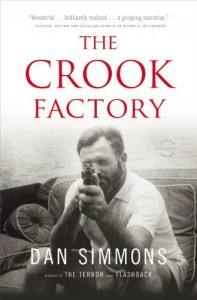 Dan Simmons has written a number of fantastic books - some of my favorites are Hyperion, Illium, and Flashback, mostly in the Science Fiction realm. But he's wide ranging - Drood was a widely regarded novel based on the life of Charles Dickens and he's also written various Horror novels.
In The Crook Factory, Simmons tackles a fun meme - the semi-fictional novelization of little known or improbable events. This is territory that reminds me of one of Tim Powers' best novels, Declare, which somehow manages to put together Kim Philby (the super spy), Lawrence of Arabia, Djinn and Nazis. In this case Simmons isn't channeling the supernatural, just the world of 1940s Cuba and J Edgar Hoover - and yes Nazis and Marlene Dietrich too. Oh, and Ernest Hemingway.
Did you know that Hemingway was a spy? Me neither.
The Crook Factory plays out through the eyes of Joe Lucas, a fictional FBI agent with a history of bending the law and being the FBI's goto person when dirty tricks or semi legal activities are involved
Joe is sent to become part of, and spy on, Hemingway's burgeoning spy ring - the crook factory. Through Joe we meet, and become very close to, Ernest Hemingway - the writer, the lover, the prodigious drinker, the pugilist, the sentimentalist, the blowhard, the trickster. The novel renders Hemingway in amazing depth.
Joe and Ernest are off to fight the Nazis and sink subs (seriously), as well as the fighting off the local Cuban police while watching out for any number of competing intelligence agencies.
Crook factory is a great adventure and a fantastic history lesson all wrapped in one. Virtually all of the novel with the exception of Joe Lucas himself is well grounded in fact. I also gained a much more realized view of Hemingway the man (albeit fictionalized), and the book inspired me to return to some of Hemingway's novels (e.g. For Whom the Bell Tolls) with renewed appreciation.
If any of this sounds interesting, get The Crook Factory - you won't be sorry.
[I received a complimentary copy of The Crook Factory through the excellent LibraryThing Early Reviewers program.].
Dan Simmons has written a number of fantastic books - some of my favorites are Hyperion, Illium, and Flashback, mostly in the Science Fiction realm. But he's wide ranging - Drood was a widely regarded novel based on the life of Charles Dickens and he's also written various Horror novels.
In The Crook Factory, Simmons tackles a fun meme - the semi-fictional novelization of little known or improbable events. This is territory that reminds me of one of Tim Powers' best novels, Declare, which somehow manages to put together Kim Philby (the super spy), Lawrence of Arabia, Djinn and Nazis. In this case Simmons isn't channeling the supernatural, just the world of 1940s Cuba and J Edgar Hoover - and yes Nazis and Marlene Dietrich too. Oh, and Ernest Hemingway.
Did you know that Hemingway was a spy? Me neither.
The Crook Factory plays out through the eyes of Joe Lucas, a fictional FBI agent with a history of bending the law and being the FBI's goto person when dirty tricks or semi legal activities are involved
Joe is sent to become part of, and spy on, Hemingway's burgeoning spy ring - the crook factory. Through Joe we meet, and become very close to, Ernest Hemingway - the writer, the lover, the prodigious drinker, the pugilist, the sentimentalist, the blowhard, the trickster. The novel renders Hemingway in amazing depth.
Joe and Ernest are off to fight the Nazis and sink subs (seriously), as well as the fighting off the local Cuban police while watching out for any number of competing intelligence agencies.
Crook factory is a great adventure and a fantastic history lesson all wrapped in one. Virtually all of the novel with the exception of Joe Lucas himself is well grounded in fact. I also gained a much more realized view of Hemingway the man (albeit fictionalized), and the book inspired me to return to some of Hemingway's novels (e.g. For Whom the Bell Tolls) with renewed appreciation.
If any of this sounds interesting, get The Crook Factory - you won't be sorry.
[I received a complimentary copy of The Crook Factory through the excellent LibraryThing Early Reviewers program.].
Minor Episodes / Major Ruckus (The Chaos! Quincunx)
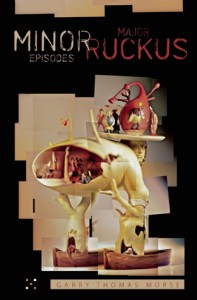 I received Minor Episodes through the LibraryThing Early Reviewers program. It sounded intriguing and odd. From the blurb: "Minor Episodes documents the serial adventures of Minor, the ubiquitous “everymogul” who embodies the economic one percent and keeps musically erotic quixotics on tap. Having entered a “rent in time” that gives each chapter an alternate reality, Minor swaggers through an undersea casino, an in-flight blockbuster, a bawdy Western and a Kafkaesque job hunt, cavorting with billboard queen Bébé Lala and country-music legend Faith Faith, when not dressing down his shifty sidekick, The Concierge, or haunting the intensely disinterested songstress Miss Sharp. Danger looms in the form of The Stropper, a serial killer fresh out of a shaving promotion, and an enigmatic ginger-beer icon who has retired from a satisfying life of culinary assassinations."
This is not a "normal" book. The language seems almost invented. Think a "new age" Finnegan's Wake. I thought I was up for it. The language is quite hypnotic. I found myself reading closely for 2 or 3 pages, at which point I'd realize I had no idea what I'd just read or what was supposed to be happening. The prose was quite interesting from a theoretical point of view; but in terms of having any idea what was going on, not so much.
In the end i had to quit after 2 chapters. I just couldn't follow. A for experimental uniqueness; failing grade for a compelling read.
I received Minor Episodes through the LibraryThing Early Reviewers program. It sounded intriguing and odd. From the blurb: "Minor Episodes documents the serial adventures of Minor, the ubiquitous “everymogul” who embodies the economic one percent and keeps musically erotic quixotics on tap. Having entered a “rent in time” that gives each chapter an alternate reality, Minor swaggers through an undersea casino, an in-flight blockbuster, a bawdy Western and a Kafkaesque job hunt, cavorting with billboard queen Bébé Lala and country-music legend Faith Faith, when not dressing down his shifty sidekick, The Concierge, or haunting the intensely disinterested songstress Miss Sharp. Danger looms in the form of The Stropper, a serial killer fresh out of a shaving promotion, and an enigmatic ginger-beer icon who has retired from a satisfying life of culinary assassinations."
This is not a "normal" book. The language seems almost invented. Think a "new age" Finnegan's Wake. I thought I was up for it. The language is quite hypnotic. I found myself reading closely for 2 or 3 pages, at which point I'd realize I had no idea what I'd just read or what was supposed to be happening. The prose was quite interesting from a theoretical point of view; but in terms of having any idea what was going on, not so much.
In the end i had to quit after 2 chapters. I just couldn't follow. A for experimental uniqueness; failing grade for a compelling read.
The Master Spy: The Story of Kim Philby
 Imagine if the number 2 or 3 person at the CIA was a Soviet agent. Sounds impossible, right? Not so. Kim Philby was responsible for counter-intelligence for MI-6, the home of James Bond and England's equivalent to the CIA. Philby was a life-long communist agent, a mole in Britain's intelligence establishment.
The Master Spy is his biography - Knightly spent time with Philby in Russia, shortly before his death, and produced this work. It gives enormous insight into what might lead someone to betray their country and send many men to their deaths.
Imagine if the number 2 or 3 person at the CIA was a Soviet agent. Sounds impossible, right? Not so. Kim Philby was responsible for counter-intelligence for MI-6, the home of James Bond and England's equivalent to the CIA. Philby was a life-long communist agent, a mole in Britain's intelligence establishment.
The Master Spy is his biography - Knightly spent time with Philby in Russia, shortly before his death, and produced this work. It gives enormous insight into what might lead someone to betray their country and send many men to their deaths.
The Gun Seller
 As part of LibraryThing's wonderful Early Reviewers program, I was able to get a copy of Hugh Laurie's The Gun Seller. You probably know Hugh Laurie as "House", from the TV show. He's also a musician (has a blues CD out), and, apparently, a novelist as well.
I was initially surprised to find it was an audio book; I thought it was going to be a physical copy of the book. This is actually my first audiobook, I've never done one before, so take my review with a grain of salt.
Thomas Lang is a former Scots Guard member. Offered money to assassinate someone, he declines, and proceeds to warn the target. From there, things start to go wrong in a no-good-deed-goes-unpunished sort of way. The early part of the book feel very much like a typical gumshoe novel, there's beautiful women, guns, spies, all the trappings of a good adventure novel.
Simon Prebble provides the voice, a great "upper crust" English accent, which is fun. Laurie's plotting is also fun. Thomas Lang is the wisecracking type. About every third sentence has some kind of snark, joke, sarcasm or witticism. I found it amusing for about 3 chapters, but when in the 4th chapter of a book, every other sentence has some bad joke in it, it becomes a bit much. I wasn't quite sure whether this was intended tongue-in-cheek or not, but in the end it became tiresome. This may be due to the audiobook format; in written form it might not have been annoying. Lang tends to talk in parenthetical remarks - I think there was one sentence that had a parenthetical remark inside a parenthetical remark. It was often hard to follow in audio form - again, it may simply be the Laurie's style doesn't translate well to audiobooks.
In the end I think this is a book I'd rather read than listen to, but it was entertaining.
As part of LibraryThing's wonderful Early Reviewers program, I was able to get a copy of Hugh Laurie's The Gun Seller. You probably know Hugh Laurie as "House", from the TV show. He's also a musician (has a blues CD out), and, apparently, a novelist as well.
I was initially surprised to find it was an audio book; I thought it was going to be a physical copy of the book. This is actually my first audiobook, I've never done one before, so take my review with a grain of salt.
Thomas Lang is a former Scots Guard member. Offered money to assassinate someone, he declines, and proceeds to warn the target. From there, things start to go wrong in a no-good-deed-goes-unpunished sort of way. The early part of the book feel very much like a typical gumshoe novel, there's beautiful women, guns, spies, all the trappings of a good adventure novel.
Simon Prebble provides the voice, a great "upper crust" English accent, which is fun. Laurie's plotting is also fun. Thomas Lang is the wisecracking type. About every third sentence has some kind of snark, joke, sarcasm or witticism. I found it amusing for about 3 chapters, but when in the 4th chapter of a book, every other sentence has some bad joke in it, it becomes a bit much. I wasn't quite sure whether this was intended tongue-in-cheek or not, but in the end it became tiresome. This may be due to the audiobook format; in written form it might not have been annoying. Lang tends to talk in parenthetical remarks - I think there was one sentence that had a parenthetical remark inside a parenthetical remark. It was often hard to follow in audio form - again, it may simply be the Laurie's style doesn't translate well to audiobooks.
In the end I think this is a book I'd rather read than listen to, but it was entertaining.
Mission to Paris
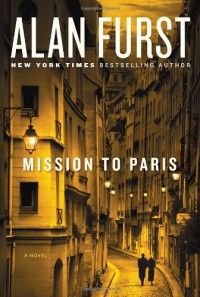 Through the LibraryThing Early Reviewers program, I was fortunate enough to receive a pre-release copy of Mission to Paris, a new novel from highly regarded historical spy novelist Alan Furst. Furst specializes in World War II era fiction. Having reviewed other books in the program from less-established authors, starting Mission to Paris was like slipping into a warm bath - the prose fluid and accessible, without a jarring phrasing or word out of place.
Mission to Paris is the story of a somewhat famous actor's trip to Paris, shortly before the outbreak of World War II. Fredric Stahl is Viennese-born, but lives in Hollywood now. As part of a cross-Studio movie deal, he finds himself sent to Paris to film a movie. A famous actor turned spy (this is a spy novel) could easily turn to cliché, but Furst easily humanizes Stahl, while staying true to the perks that would come with being a well-known actor. As Stahl crosses the Atlantic on an ocean liner, he finds himself on a deck chair with his arms around a married woman (Stahl is unsurprisingly successful with the ladies). And yet:
"They lay together on the deck chair, she in formal gown, he in tuxedo, the warmth of her body welcome on the chilly night, the soft weight of her breast, resting gently against him, a promise that wouldn't be kept but a sweet promise just the same. Edith, he thought. Or was it Edna?”
In two sentences, Stahl is rendered as maybe a cad for potentially sleeping with a married woman, a typical actor who doesn't even remember the names of women he's with, and yet he sends her back to her husband without taking advantage.
Furst effortlessly re-creates the era. Starting the story on an ocean liner immediately creates context. The attention to period detail is deep without being boring. Furst includes verbatim a daily ship's newsletter (I assume it is fictional), with world news (Neville Chamberlain meeting with Hitler, preparing to sell out Czechoslovakia) and sport news (Whizzer White the football player injured) right next to tomorrow's shuffleboard schedule.
Pre-war Paris is also quickly and effortlessly evoked. Within pages, you are ensconced in a cafe tasting the croissants, out and about on the warm September Paris evenings….
"Walking slowly, looking at everything, he couldn't get enough of the Parisian air: it smelled of a thousand years of rain dropping on stone, smelled of rough black tobacco and garlic and drains, of perfume, of potatoes frying in fat. A warm evening, people were out, the bistros crowded and noisy.”
And yet, bad things are afoot.
“On the wall of a newspaper kiosk, closed down for the night, the day’s front page headlines were still posted: CZECHOSLOVAKIA DECLARES STATE OF EMERGENCY.”
Mission to Paris is about the fall of Paris. Germany militancy is rising, and there are two camps in Paris, those who want to resist Germany and those who do not. Those who do not speak the language of peace: Rapprochement, Mutual Respect, Reconciliation, Peace, “avoid war at any cost”. But the implication - Capitulation - is painfully clear. Any many of those on the side of "Rapproachement" are wittingly or unwittingly in the service of the Germans.
What mission to Paris is really about is how easily one can be seduced to the wrong side by fair words, noble concepts and good intentions, together with bribes disguised as "speaking fees" or advertising budgets, and ultimately it's about the lies one tells oneself to sleep at night.
Many well-known names are named by Furst as working to bring down the French Government - Taittinger of the famous Champagne, Hennessy of the famous Cognac, the Michelin brothers who led the tire empire. It's almost painful to listen to the cocktail party chatter about the benefits of peace and avoiding war at any cost with the Germans, knowing what horror the Nazis will bring to the world. Stahl chooses sides - the right one - but as a famous personality is constantly beset by forces from both sides that want to use him. Along the way, he finds love, adventure, and the courage to do what's necessary.
If you like historical fiction or spy novels, you will not be disappointed. Mission to Paris reads smoothly and rapidly with great characters and period detail, and, as with all great historical fiction, contains lessons and perspective for today’s world as well.
Through the LibraryThing Early Reviewers program, I was fortunate enough to receive a pre-release copy of Mission to Paris, a new novel from highly regarded historical spy novelist Alan Furst. Furst specializes in World War II era fiction. Having reviewed other books in the program from less-established authors, starting Mission to Paris was like slipping into a warm bath - the prose fluid and accessible, without a jarring phrasing or word out of place.
Mission to Paris is the story of a somewhat famous actor's trip to Paris, shortly before the outbreak of World War II. Fredric Stahl is Viennese-born, but lives in Hollywood now. As part of a cross-Studio movie deal, he finds himself sent to Paris to film a movie. A famous actor turned spy (this is a spy novel) could easily turn to cliché, but Furst easily humanizes Stahl, while staying true to the perks that would come with being a well-known actor. As Stahl crosses the Atlantic on an ocean liner, he finds himself on a deck chair with his arms around a married woman (Stahl is unsurprisingly successful with the ladies). And yet:
"They lay together on the deck chair, she in formal gown, he in tuxedo, the warmth of her body welcome on the chilly night, the soft weight of her breast, resting gently against him, a promise that wouldn't be kept but a sweet promise just the same. Edith, he thought. Or was it Edna?”
In two sentences, Stahl is rendered as maybe a cad for potentially sleeping with a married woman, a typical actor who doesn't even remember the names of women he's with, and yet he sends her back to her husband without taking advantage.
Furst effortlessly re-creates the era. Starting the story on an ocean liner immediately creates context. The attention to period detail is deep without being boring. Furst includes verbatim a daily ship's newsletter (I assume it is fictional), with world news (Neville Chamberlain meeting with Hitler, preparing to sell out Czechoslovakia) and sport news (Whizzer White the football player injured) right next to tomorrow's shuffleboard schedule.
Pre-war Paris is also quickly and effortlessly evoked. Within pages, you are ensconced in a cafe tasting the croissants, out and about on the warm September Paris evenings….
"Walking slowly, looking at everything, he couldn't get enough of the Parisian air: it smelled of a thousand years of rain dropping on stone, smelled of rough black tobacco and garlic and drains, of perfume, of potatoes frying in fat. A warm evening, people were out, the bistros crowded and noisy.”
And yet, bad things are afoot.
“On the wall of a newspaper kiosk, closed down for the night, the day’s front page headlines were still posted: CZECHOSLOVAKIA DECLARES STATE OF EMERGENCY.”
Mission to Paris is about the fall of Paris. Germany militancy is rising, and there are two camps in Paris, those who want to resist Germany and those who do not. Those who do not speak the language of peace: Rapprochement, Mutual Respect, Reconciliation, Peace, “avoid war at any cost”. But the implication - Capitulation - is painfully clear. Any many of those on the side of "Rapproachement" are wittingly or unwittingly in the service of the Germans.
What mission to Paris is really about is how easily one can be seduced to the wrong side by fair words, noble concepts and good intentions, together with bribes disguised as "speaking fees" or advertising budgets, and ultimately it's about the lies one tells oneself to sleep at night.
Many well-known names are named by Furst as working to bring down the French Government - Taittinger of the famous Champagne, Hennessy of the famous Cognac, the Michelin brothers who led the tire empire. It's almost painful to listen to the cocktail party chatter about the benefits of peace and avoiding war at any cost with the Germans, knowing what horror the Nazis will bring to the world. Stahl chooses sides - the right one - but as a famous personality is constantly beset by forces from both sides that want to use him. Along the way, he finds love, adventure, and the courage to do what's necessary.
If you like historical fiction or spy novels, you will not be disappointed. Mission to Paris reads smoothly and rapidly with great characters and period detail, and, as with all great historical fiction, contains lessons and perspective for today’s world as well.
When the Shark Bites
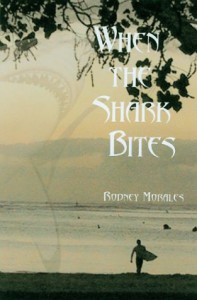 A look inside the real Hawaii and the views of native Hawaiians, switching between the 1970s and more current times.
A look inside the real Hawaii and the views of native Hawaiians, switching between the 1970s and more current times.
Hide Me Among the Graves: A Novel
 Tim Powers is the master of the historical magical fantasy novel. Weaving together fragments of historical truth with magical arcana, any Powers novel is a treat. Declare, for example, connected little known, but true, facts about Kim Philby, Lawrence of Arabia, and Communist Russia with djinn and demons to create a wonderfully atmospheric novel. In Hide Me Among the Graves, he does the same for the Victorian poets, Vampires, and Boudica, the early English queen of the Iceni who razed London when it was controlled by the Romans.
Christina Rossetti and Dante Gabriel Rossetti, also historical Victorian poets, are haunted by the vampiric ghost of John Polidori, the (historical) physician to Lord Byron, and author of one of the earliest Vampire stories in English. Being haunted by a Vampire, or bitten by one, seems to give one the power to create poetry of the highest quality, not accessible to normal humans. Byron, Shelley, and Algernon Swinburne (who figures prominently in the novel), all are under the sway of vampires, or are vampires themselves. The various excerpts of poetry selected as chapter headings by Powers definitely seem inspired by the direct experience of the supernatural.
The central characters of Hide Me Among the Graves are the veterinarian Crawford and former prostitute McKee, who had a daughter after being thrown together after an encounter with the supernatural, and try to save their daughter from the ghost of Polidori. Victorian England is painted vividly in the novel, and Crawford and McKee experience the usual supernatural trials that await any Tim Powers protagonists. They are assisted by the (again historical) Edward John Trelawny, the associate of Byron, who is himself trapped between the race of Vampires and humans.
As with most Powers' novels, there is a well-developed and internally consistent logic to the supernatural and magic that drives the novel. The arcana of Vampires and magical talismans are carefully woven into real history. The result is a fine, enjoyable novel. Perhaps not of the same quality as Last Call or Declare, but close. If you love those novels you will enjoy Hide Me Among the Graves.
[I received a copy of Hide Me Among The Graves as part of the Early Reviewers program]
Tim Powers is the master of the historical magical fantasy novel. Weaving together fragments of historical truth with magical arcana, any Powers novel is a treat. Declare, for example, connected little known, but true, facts about Kim Philby, Lawrence of Arabia, and Communist Russia with djinn and demons to create a wonderfully atmospheric novel. In Hide Me Among the Graves, he does the same for the Victorian poets, Vampires, and Boudica, the early English queen of the Iceni who razed London when it was controlled by the Romans.
Christina Rossetti and Dante Gabriel Rossetti, also historical Victorian poets, are haunted by the vampiric ghost of John Polidori, the (historical) physician to Lord Byron, and author of one of the earliest Vampire stories in English. Being haunted by a Vampire, or bitten by one, seems to give one the power to create poetry of the highest quality, not accessible to normal humans. Byron, Shelley, and Algernon Swinburne (who figures prominently in the novel), all are under the sway of vampires, or are vampires themselves. The various excerpts of poetry selected as chapter headings by Powers definitely seem inspired by the direct experience of the supernatural.
The central characters of Hide Me Among the Graves are the veterinarian Crawford and former prostitute McKee, who had a daughter after being thrown together after an encounter with the supernatural, and try to save their daughter from the ghost of Polidori. Victorian England is painted vividly in the novel, and Crawford and McKee experience the usual supernatural trials that await any Tim Powers protagonists. They are assisted by the (again historical) Edward John Trelawny, the associate of Byron, who is himself trapped between the race of Vampires and humans.
As with most Powers' novels, there is a well-developed and internally consistent logic to the supernatural and magic that drives the novel. The arcana of Vampires and magical talismans are carefully woven into real history. The result is a fine, enjoyable novel. Perhaps not of the same quality as Last Call or Declare, but close. If you love those novels you will enjoy Hide Me Among the Graves.
[I received a copy of Hide Me Among The Graves as part of the Early Reviewers program]
Music, The Brain, And Ecstasy: How Music Captures Our Imagination
 Interesting read on the pyscho-acoustics of how the brain hears and reacts to music. Interesting theories, but many of them are ultimately unconvincing to me. Interestingly mentions a study that suggests that listening to music produces endorphins, perhaps leading to "music addiction". Very classical/western music centric.
Interesting read on the pyscho-acoustics of how the brain hears and reacts to music. Interesting theories, but many of them are ultimately unconvincing to me. Interestingly mentions a study that suggests that listening to music produces endorphins, perhaps leading to "music addiction". Very classical/western music centric.
Casino Royale: A James Bond Novel (James Bond Novels, Book 1)
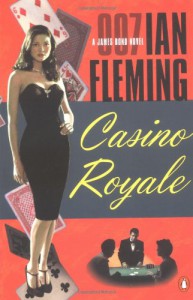 Three measures of Gordon's, one of vodka, half a measure of Kina Lillet. Shake it very well until it's ice-cold, then add a large thin slice of lemon peel. Got it?
Three measures of Gordon's, one of vodka, half a measure of Kina Lillet. Shake it very well until it's ice-cold, then add a large thin slice of lemon peel. Got it?
Dancing with Eternity
 Dancing with Eternity is a first novel by John Patrick Lowrie. It's the far distant future and people mostly no longer die. Their memories and personality are constantly uploaded to a central storage area, and if one's body should fail, the personality is simply re-downloaded into a new one. As a side effect, there are no children, no permanent marriages or monogamy, and people are effectively immortal. As a result, most people have done many things, held many roles, lived on many planets. Our hero Mohandas ("Mo") is one of the oldest of the immortals, although he does not disclose that to those he knows.
The novel starts with a bit of a cliche'd sci-fi noir opening - our down and out hero Mo is in a bar when a stunning woman comes in - albeit one with cat's eyes and head-to-toe fur, who makes straight for our hero, and proceeds to involve him in mysterious goings-on. Steel is the Captain of the starship LightDancer. Mo become powerfully attracted to Steel and quickly joins her crew and is outbound for another planet.
Dancing with Eternity strong echoes Richard Morgan's amazing Altered Carbon, which explores the concept of downloading people into new bodies. Altered Carbon explores it in greater variety (e.g. gender reversal) and has a much more sharply defined central mystery. It's much darker than Dancing with Eternity, and the sex in Dancing with Eternity is mostly implied, in contrast to Morgan's explicitness. Dancing also echoes a lot of Heinlein, so lovers of "adventure science fiction" will enjoy it. The internal world building is good, and the future history as presented in the novel is entirely plausible. In particular the effect of being immortal on one's personality is explored at length. I found Lowrie's evocation of that not nearly as compelling as, for example, the depth of character of Lazarus Long in Time Enough for Love. I also found the back half of the book to be too much "they went there they did this" recitation - the plot tension and pacing was lost somewhat and the central mystery of the novel elongated unnecessarily.
All in all it's a very good first novel - not as strong as Altered Carbon, or, say, Neuromancer, which set the bar for first-time science fiction authors, but still a fine outing and an enjoyable read.
[I received a copy of Dancing with Eternity as part of LibraryThing's Early Reviewer program.]
Dancing with Eternity is a first novel by John Patrick Lowrie. It's the far distant future and people mostly no longer die. Their memories and personality are constantly uploaded to a central storage area, and if one's body should fail, the personality is simply re-downloaded into a new one. As a side effect, there are no children, no permanent marriages or monogamy, and people are effectively immortal. As a result, most people have done many things, held many roles, lived on many planets. Our hero Mohandas ("Mo") is one of the oldest of the immortals, although he does not disclose that to those he knows.
The novel starts with a bit of a cliche'd sci-fi noir opening - our down and out hero Mo is in a bar when a stunning woman comes in - albeit one with cat's eyes and head-to-toe fur, who makes straight for our hero, and proceeds to involve him in mysterious goings-on. Steel is the Captain of the starship LightDancer. Mo become powerfully attracted to Steel and quickly joins her crew and is outbound for another planet.
Dancing with Eternity strong echoes Richard Morgan's amazing Altered Carbon, which explores the concept of downloading people into new bodies. Altered Carbon explores it in greater variety (e.g. gender reversal) and has a much more sharply defined central mystery. It's much darker than Dancing with Eternity, and the sex in Dancing with Eternity is mostly implied, in contrast to Morgan's explicitness. Dancing also echoes a lot of Heinlein, so lovers of "adventure science fiction" will enjoy it. The internal world building is good, and the future history as presented in the novel is entirely plausible. In particular the effect of being immortal on one's personality is explored at length. I found Lowrie's evocation of that not nearly as compelling as, for example, the depth of character of Lazarus Long in Time Enough for Love. I also found the back half of the book to be too much "they went there they did this" recitation - the plot tension and pacing was lost somewhat and the central mystery of the novel elongated unnecessarily.
All in all it's a very good first novel - not as strong as Altered Carbon, or, say, Neuromancer, which set the bar for first-time science fiction authors, but still a fine outing and an enjoyable read.
[I received a copy of Dancing with Eternity as part of LibraryThing's Early Reviewer program.]




